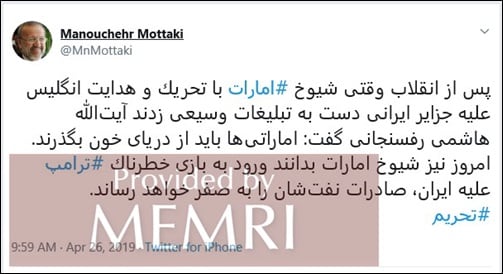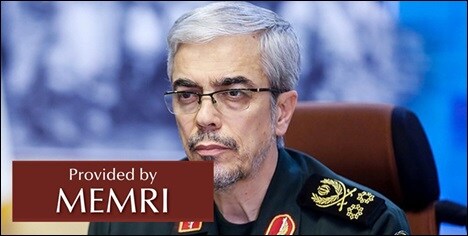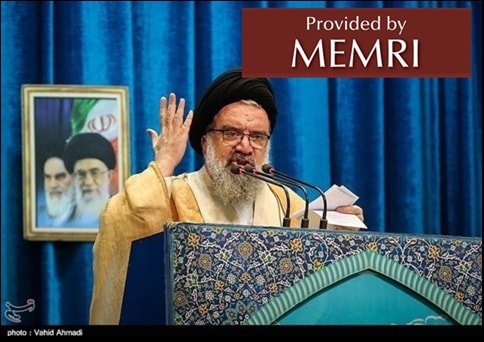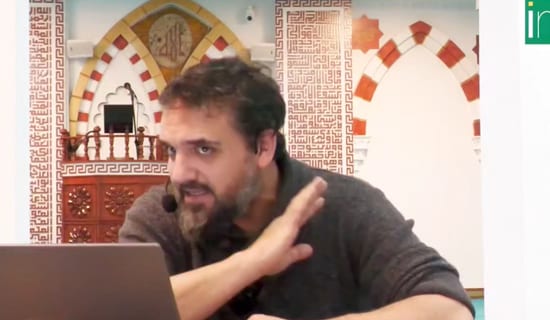Following the recent spate of attacks on oil tankers and oil facilities in the Gulf of Oman, and U.S. accusations that Iran is behind them, Iranian spokesmen have in effect denied all connection to them, claiming that their timing is suspect and that they could have been carried out by a third party, or by the U.S. itself in order to justify its aggression against Iran.[1]
In reality, for the past few months senior Iranian spokesmen, from Iranian Supreme Leader Ali Khamenei himself to senior officials of Iran's Islamic Revolutionary Guards Corps (IRGC) and the Iranian Foreign Ministry, and Majlis representatives have threatened the U.S., Saudi Arabia, and the UAE, noting specifically that if Iranian oil cannot be exported via the Persian Gulf, no one else's will be exported from the region either. Some of the speakers even explicitly pointed out that the attacks in Saudi Arabia and the UAE are aimed at preventing these countries from exporting oil.
Additionally, Iranian spokesmen are claiming that the U.S. is waging an economic war against Iran and that therefore Iran is entitled to defend itself against the U.S. and its allies. They are also pointing out that all U.S. bases and troops in the region are vulnerable to attacks by Iran and the resistance axis.[2]
Furthermore, in several instances this past year, senior Iranian elements have said that Iran was behind the attacks on oil tankers and oil facilities in the Gulf of Oman and the Red Sea and on Saudi Arabia itself.
The following are details of senior Iranian officials' threats and acknowledgement of Iranian responsibility for the attacks on the oil tankers and oil facilities:
Senior Iranian Regime Officials: "Iranian Officials Threaten: "If Our Oil Does Not Pass Through The Strait Of Hormuz, Neither Will Other [Countries'] Oil"
A MEMRI Inquiry and Analysis report, How Will Iran Prevent The Export Of Oil From The Persian Gulf To World Markets? (May 6, 2019), examined the threats by Iranian officials, as follows:
Khamenei said at an April 24 meeting with workers, in advance of Iran's Labor and Workers Week: "The [U.S.] effort in the matter of oil will go nowhere. We can export our oil as much as we need to and in any quantity we need to. They are imagining now that they will block the [oil shipping] lanes... They are acting with hostility against us and they must know that their hostility will not go unanswered. They will receive an appropriate response to this hostility. The Iranian nation is not one that sits and observes quietly while others plot and act against it."[3]
Iranian President Hassan Rohani was more explicit, threatening Saudi Arabia and the UAE at an April 24 government meeting: "You, who exist in Iran's shadow, how can you tell [President] Trump that if he cuts Iranian oil exports to zero you will compensate for this? Don't you know that Trump's term will end, and we will remain, and that neighbors live next to each other for many long years? Better you should think about permanent friendship in the region. You are alive by virtue of Iran. This is not a lie or a slogan. We prevented your states from being destroyed. How can you today cooperate with our enemies?"[4]
View the MEMRI TV clip of Rohani's statements here or below
Former Iranian foreign minister Manouchehr Mottaki tweeted on April 26: "The sheikhs from the emirates should know that their entering Trump's dangerous game against Iran will bring their oil exports to zero."[5]

Mottaki's tweet, April 26, 2019.
Maj.-Gen. Mohammad Bagheri, chief of the General Staff of Iran's Armed Forces, said on the margins of the 23rd conference of police commanders and administrators, held April 28: "The Iranian leadership has said on many occasions that securing the Strait of Hormuz is the responsibility of Iran's Armed Forces, and we want it [the strait] to be secure and open. Our oil and products must pass through it, just as the oil and products of other countries do. The Iranian leadership has also said that if anyone threatens the security of the Strait of Hormuz, we will certainly take care of them.
"If our oil does not pass through the Strait of Hormuz, neither will other [countries'] oil. This does not mean [that we intend to] close the strait. We do not mean to close the Strait of Hormuz unless the enemies' hostility reaches a level that leaves us no choice – and we are capable of implementing this, and the enemies know it."[6]

Maj. Gen. Mohammad Bagheri, chief of the General Staff of the Armed Forces (image: Fars, Iran, April 28, 2019)
Hossein Sheikholislam, former Iranian ambassador to Syria and currently a Foreign Ministry advisor, threatened on April 29: "America knows very well that if it does anything [against Iran], all its bases in the region will be targets of a hail of precision missiles. The Gulf countries' oil will leave for other parts of the world only if Iranian oil is sold [as well]."[7]
On May 3, 2019, in his reaction to the U.S. announcement of its intent to reduce Iranian oil exports to zero, Iranian Council of Experts and Tehran Friday preacher Ayatollah Ahmad Khatami told worshipers, "America's satanic acts will not go unanswered."[8]

Friday preacher Khatami: "America's satanic acts will not go unanswered." (Source: Tasnim, May 3, 2019)
SUPPORT OUR WORK

IRGC Navy Commander Alireza Tangsiri told Al-Alam TV on April 22: "According to international law, the Strait of Hormuz is a sea lane, and if we are prevented from using it, we will close it. If we are threatened in any way, we will not hesitate to defend Iran's territorial waters. We will defend our pride, and wherever the discourse focuses on defending Iran's rights, we will [also] take retaliatory action. The foreigners do not care about the security of this region, and do not care if their moves bring about its destruction. The foreigners who are present in the region are enemies of its nations and are considered a threat to the region."[9]
On May 13, 2019, the IRGC-affiliated Fars news agency aired a video in which Tangsiri spoke about the presence of the USS Abraham Lincoln aircraft carrier in the Persian Gulf, saying: "If the enemy makes any mistake, we can, in the first stage, attack all the American equipment and infrastructure in the area, and destroy them."
View the video of Tangsiri's statements on MEMRI TV here or below:
On April 13, 2019, the regime mouthpiece Kayhan called for striking U.S. economic interests in the region and blocking the export of Saudi oil from the Persian Gulf and the Red Sea (see MEMRI Special Dispatch No. 8014, Iranian Regime Mouthpiece 'Kayhan' Calls For Targeting America's Economic Interests In The Region, Blocking Strait Of Hormuz And Red Sea To Saudi Oil Exports, April 22, 2019).
On May 13, 2019, Kayhan explained in an editorial titled "How We Will Stop The Enemy's Economic War" that "our solution for the enemy's [i.e. the U.S.'s] economic war is to strike at the same enemy that forced economic and trade costs on us... We have at our disposal three capabilities: striking economically, militarily, and psychologically in order to stop the enemy's economic war. In the economic area, our hands are not tied; the [U.S.'s] partners, who are in fact 'those who store the American oil in the region' – that is, Saudi Arabia and the UAE – are dependent on two things: a) oil and b) the towers, seemingly of glass, built in the Persian Gulf and Red Sea region...
"The question is why Iran is allowing the economic and commercial situation of both these countries in the region [i.e. Saudi Arabia and the UAE] to continue as usual. Is the situation in which we [find ourselves] – we who have committed no crime against them – continuing as usual?! Furthermore, we must absolutely conduct a fundamental strike on both these countries' oil export capabilities, that is, on their artery of life, and we can do so in the Indian Ocean and the Red Sea.
"This is not something that can lead to war. This move will lead Saudi Arabia and the UAE to peace with Iran, because they will not be able to fight Iran, and [also] America will not be able to wage the dispute with Iran if Iran is in dispute with Saudi Arabia... Now, we need the assistance of [our] country's armed forces in order to stop the economic war machine. Iran's country's defensive forces must open this space, the important part of which is in danger from the enemy, to Iranian economic traffic. When the enemy squeezes our throat economically, particularly in the areas of banking and oil, the country's armed forces will release Iran's throat by squeezing the enemy's throat."[10]
On June 4, 2019, Hosssein Amir Amirabdollahian, special aide to the Majlis speaker, tweeted about Saudi Arabia: "If #Saudi rulers do not stop aiding & abetting the #US in its economic war against #Iran, they must wait for its new and shocking decision. The clock is ticking so fast for the continuity of Saudi-#Emirati-#Israeli dirty policies."

Twitter.com/Amirabdollahian, June 4, 2019.
At a June 10 joint press conference with German Foreign Minister Maas, at the conclusion of Maas' Tehran visit, Iranian Foreign Minister Zarif warned: "The tension in our region is because of America's economic war on Iran. The only way to reduce the tension in the region is to stop this economic war. You cannot expect the economic war on the Iranian people to continue [while] the people who began it or support it are protected."[11]
On June 2, 2019, Gen. Yahyah Safavi, advisor and aide to Iranian Supreme Leader Ali Khamenei and former commander of Iran's Islamic Revolutionary Guards Corps (IRGC), said: "The Americans have 25 military bases in the region, including the CENTCOM air command in Qatar, the ground forces command in Kuwait and the naval command in Bahrain. These bases house over 20,000 troops. The Americans know very well that this military force is in range of Iran's missiles. Moreover, in the Persian Gulf, all of the American navy [vessels, and the vessels of other] foreign [countries], are within range of the IRGC's surface-to-sea missiles. These missiles have a range of 300 km, i.e., can span the distance between the Iranian shore and the opposite shore [of the Gulf]."[12]
Against the backdrop of the most recent attack on U.S. interests in Baghdad, on June 15, 2019, that was reported on by the London-based Saudi daily Al-Sharq Al-Awsat,[13] the Iranian daily Jaam-e Jam, the mouthpiece of Iranian national television which is close to Khamenei, published an article on June 16 titled "America's Glass House in Iraq." The article reviewed the missile and shelling attacks in recent months on U.S. interests in Baghdad's Green Zone and near U.S. military bases in Iraq, particularly underlining the most recent attack. It stated: "This is not the last time that news of an attack on the U.S. Embassy in Baghdad is published, although some of [this news] is denied [by the U.S. media]. It will certainly not be the last time..."
The article continued: "All this attests to the grave vulnerability of the Americans in Iraq; they are sitting in a glass house and fear an attack from a different direction at any time... Every intensification in the Iran-U.S. tension has the power to directly target U.S. troops in Iraq, and to add to the casualties there."[14]
Photo accompanying the Jaam-e Jam article, June 16, 2019.
Iranian Acknowledges It Carried Out Terror Attacks In The Region On Oil Tankers, Facilities In The Gulf Of Oman, Red Sea
In August 2018, Gen. Naser Sha'bani, a top IRGC official, boasted that Iran had instructed the pro-Iran Houthi militia in Yemen, Ansar Allah, to attack two Saudi tankers, which apparently happened in July in the Red Sea, and which caused Saudi Arabia to order a temporary halt to its oil exports from the region. Later on, Sha'bani clarified that Hizbullah in Lebanon and Ansar Allah in Yemen were Iran's "homeland depth," and warned that Iran would activate them against its rivals in the region, particularly Saudi Arabia (see MEMRI Special Dispatch No.7612, Statements By Top IRGC Official Gen. Sha'bani Published By Fars News Agency: "We Told The Yemenis To Attack The Two Saudi Tankers, And They Attacked," August 7, 2018).
Following May 12, 2019 reports of attacks on oil tankers at Fujairah Port, off the coast of the UAE's Emirate of Fujairah in the Gulf of Oman, as well as in the Red Sea, senior IRGC-affiliated Iranian journalists tweeted that Iran had carried out the attacks (see MEMRI Special Dispatch No.8062, Editors Of Iranian IRGC-Affiliated Newspapers: Iran Is Behind Fujairah And Yanbu Attacks; Possibility Of Additional Attacks In Red Sea, Golan Heights, May 14, 2019).
Additionally, in its May 22, 2019 editorial, Kayhan praised the May 14, 2019 drone attacks carried out by Ansar Allah on the Saudi oil pipeline at Yanbu port. Also, without explicitly claiming that Iran was responsible for the May 12 attack on the oil tankers at Fujairah, the newspaper clarified that the message conveyed by the attack was harm to the U.S., which it said was responsible for security at the port and for the export of oil from it (see Special Dispatch No. 8082, Iranian Regime Mouthpiece 'Kayhan' Announces A War To Bring Down Saudi Regime And Reduce Saudi Oil Exports To Zero; States: America Has No Desire, Or No Capability, To Support Saudi Arabia And The UAE, May 22, 2019).
Also, IRGC commander Hossein Salami said, on May 18, 2019: "The enemies thought that we would not respond if they increased their pressure on us – but the Islamic Republic [of Iran] smashed their assumption with its recent operations."[15]
[1] See for example, statements by Rasoul Sanaei-Rad, director of the office of Iranian Supreme Leader Ali Khamenei, Yjc.ir, June 16, 2019; statements by Majlis speaker Ali Larijani at the opening of the Majlis plenum accusing the U.S. of carrying out the operation, Fars (Iran), June 16, 2019; and tweets by Hossein Amir Abdolahian, aide to the Majlis speaker, @Amirabdolahian, June 13, 2019.
[2] See statements by Iranian Foreign Minister Zarif, Tasnim, June 10, 2019; ABCnews.go.com, June 2. 2019.
[3] Farsi.khamenei.ir, April 24, 2019.
[4] President.ir.fa, April 24, 2019.
[5] Twitter.com/MnMottaki/status/1121790801141358594, April 26, 2019.
[6] Fars (Iran), April 28, 2019.
[7] Tasnim (Iran), April 29, 2019.
[8] Tasnim (Iran), May 3, 2019.
[9] Fars (Iran), April 22, 2019.
[10] Kayhan (Iran), May 13, 2019.
[11] Tasnim (Iran), June 10, 2019.
[12] Fars (Iran), June 2, 2019.
[13] The report was on Katyusha rockets being fired on June 15, 2019 at the Al-Jadriya neighborhood in central Baghdad, near the U.S. Embassy; a mortar attack on the Balad Airbase, where U.S. troops are stationed; and the launch of a missile at another base near Baghdad's international airport. These attacks came as the U.S. extended Iraq's exemption from the sanctions on Iran for another three months, allowing Iraq to, inter alia, continue buying natural gas and electricity from Iran. Al-Sharq Al-Awsat, London, June 15, 2019.
[14] Jaam-e Jam (Iran), June 16, 2019.
[15] ISNA (Iran), May 18, 2019.




